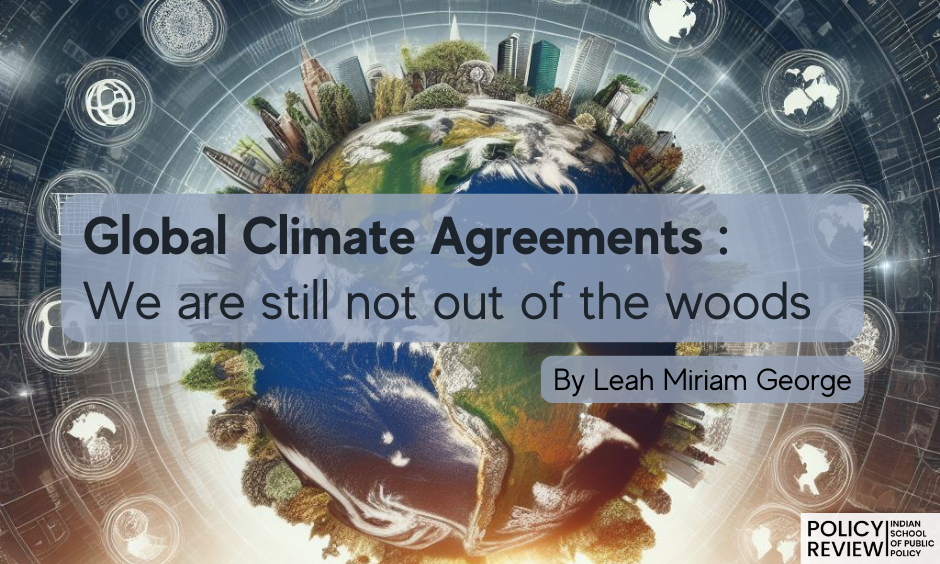
Global Climate Agreements: We are still not out of the woods

Benjamin Franklin once said, “When the well is dry, we know the value of water,” which is appropriate for our current response to climate change. The climate concern is now global; awareness has increased, and actions have become collective. Global diplomacy has intensified, resulting in the formation and ratification of treaties and agreements. Samaaj, Sarkaar, and Bazaar have awakened, and policies such as the National Action Plan on Climate Change (NAPCC) have been adopted. Amid all these efforts, the real question is: are we doing enough? How promising are the results? What awaits us?
Scientists have predicted that the Earth’s average temperature will rise by 1.5 degrees Celsius within the next two decades, even if nations drastically cut down emissions. But why is this number important? Its significance lies in the prevalence of catastrophic events such as heatwaves, droughts, floods, rising seas, acidic oceans, and the extinction of species. The effects worsen once the temperature increases by two degrees Celsius. Currently, the number stands at 1.1 degrees Celsius above the preindustrial levels, and the whole world is already experiencing some of these effects on various levels. This underscores the necessity for a global approach to combat the causes of these undesirable events.
International treaties and agreements promoting collective action have been in progress for over three decades. One of the notable ones is the historic environmental accord, the Montreal Protocol of 1987, which later became a model for future diplomacies aimed at reducing Chlorofluorocarbon (CFC) emissions. The UN Framework Convention on Climate Change (UNFCCC) (1992) established the annual forum, the Conference of Parties (COP). The Kyoto Protocol and the Paris Agreement are significant treaties operationalising UNFCCC principles. While the Kyoto Protocol was the first legally binding climate treaty focused on emission control and monitoring systems by developed countries, the Paris Agreement stood out by urging all countries to set emission-reduction pledges or their Nationally Determined Contributions (NDCs). Net zero emission of greenhouse gases, the culprit of global warming, was the target they aimed to achieve, and assessments were set to track progress.
The Global Stocktake, conducted every five years, allows countries to examine their progress in implementing the Paris Agreement. It is concerning to note that the September 2023 report reflected that the world was not on track to meet the long-term goals of the Paris Agreement. Until now, only two countries, both developing, Bhutan and Suriname, have achieved a carbon-negative state. That is, both these countries have been successful in removing more carbon content from the atmosphere than what they release. It is the conscious efforts of these countries to put environmental sustainability at the forefront of their political agenda that led to this achievement. Bhutan crossed this mark first, and some of its notable actions include making 60 per cent forest cover constitutional, banning log exports, lowering dependence on fossil fuels and providing free electricity to rural farmers to enable this lower dependence. Suriname, a South American country with 93 per cent of its land under forest cover, generates its revenue by eco-tourism. This nation’s forests act as a carbon sink, offsetting emissions from major polluters like China and India. They are even set to sell carbon credits as per the Paris Agreement. Though the policies adopted by these small countries might not apply globally, we can apply parts of these in small regions like Delhi, which is currently suffocated by high pollution. In general, the commitment of these countries to make the environment their first priority should serve as an inspiration to other countries.
However, the developing and developed countries have been debating the weight of this shared responsibility since the 1990s. Countries accuse developed nations of growing their economies without any restraint, becoming major emitters and essentially argue that the burden of reducing emissions should lie more on them. China and India are the current major emitters, and hence, developed countries argue that these nations should reduce their emissions. The blame game continues, but governments sometimes fail to realise that climate change is a shared problem and affects everyone equally. Hence, it is important for all countries to re-strategize and act responsibly. Only if strict standards on Nationally Determined Contributions (NDCs) are introduced can these countries be effectively monitored for defecting.
Amidst the ongoing finger-pointing, a spirit of cooperation can be seen as groups of countries like the G20, responsible for 80 per cent of emissions, have come together to take a strong stance on purchasing coal power. Additionally, they have decided to triple their renewable energy. Countries like the UK and US have also taken some positive measures. Building on this momentum, the recently concluded COP 28 has brought together 197 nations and the European Union to decide on strategies to control rising temperatures. Some key highlights are building the scope of viable and affordable energy sources like green hydrogen, reworking climate finance to improve collaboration between the global south and north, and addressing the loss and damages that occurred to low-income countries due to climate.
Beyond the discussions on energy and finance, the conference also saw a landmark declaration on sustainable agriculture. The decision to adopt resilient agriculture is expected to reap many positive environmental benefits. By promoting millet cultivation, known for its efficient water usage and resilience, India is already moving in the right direction. The extent of success of such projects is something that only time can show. However, no conclusions have been drawn on the carbon pricing policy, which, if implemented effectively, has the potential to put the responsibility for emissions squarely in the hands of those who produce them.
With the world stressed by two major ongoing wars, the burden on climate has worsened. The clock is ticking, warnings are all around, and the effects are well understood. As climate-conscious individuals, we must remember that now is the time we raise our voices against empty promises. Now is the time to act collectively. Now is the time to hold ourselves accountable.
References:
- Climate change: Earth is 1.1 degrees Celsius warmer than 19th century. (n.d.). India Today. https://www.indiatoday.in/science/story/climate-change-earth-is-11-degrees-celsius-warmer-than-19th-century-2322081-2023-01-16
- Maizland, L. (2023, September 15). Global Climate Agreements: Successes and Failures. Council on Foreign Relations. https://www.cfr.org/backgrounder/paris-global-climate-change-agreements
- Tzung, S. (2022, September 12). Carbon Negativity In Bhutan: An Inverse Free Rider Problem. Harvard International Review. https://hir.harvard.edu/carbon-negativity-in-bhutan-an-inverse-free-rider-problem/
- Waskow, D., Carter, R., Layke, J., Bhandari, P., Warszawski, N., Finch, M., Davey, E., Alayza, N., Berg, R. van den, Czebiniak, R., Gerholdt, R., & Cogan, D. (2023). Unpacking COP28: Key Outcomes from the Dubai Climate Talks, and What Comes Next. Www.wri.org. https://www.wri.org/insights/cop28-outcomes-next-steps

Leah Miriam George
Leah Miriam George is a scholar at the Indian School of Public Policy. She holds a postgraduate degree in Chemical Sciences from the School of Chemistry, University of Hyderabad. She is passionate about community engagement and keen to work on projects in education, environment, technology and urbanisation. Currently, she is engaged with a think tank in their e-waste sector project and showcases her prior research experience and domain knowledge to bring about amicable solutions.


